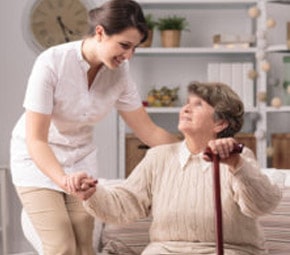According to the National Council on Aging, one in four seniors in the United States over the age of 65 will fall every year. Falling is one of the greatest risks and a leading cause of both fatal and non-fatal injuries among those over 65. Should a senior choose to remain at home, their caregivers and families should take the necessary precautions to reduce the chance of the senior falling and offer them at home senior care.
Here are a few tips for fall-proofing your senior loved one’s home:
- Make any necessary repairs and reduce the amount of clutter. – Giving the senior’s home a deep cleaning and clear-out is one of the best ways to help reduce their chance of falling. Pick up any small items that are on the floor, put away boxes that are in the walkways, and secure any wiring that could be easily tripped over. Also, take a close look at any rugs or carpeting in the home to make sure that they do not come up easily or slide. Rubber rug pads should be used to help keep them in place if this is a problem. Make things easily accessible for your senior or loved one so that they are not tempted to stand on a stool or ladder to reach things.
- Try to avoid stairs. – Seniors who experience mobility problems should try to avoid stairs altogether. If a one-story home is not possible, then make the flight of stairs as safe as possible by installing additional handrails. If the senior’s mobility issues will not allow them to climb the stairs at all, a seated stairlift is a great option.
- Install additional bars and handrails throughout the home. – If he or she needs additional assistance standing up or maneuvering throughout their home, have handrails and bars installed in places where they have issues. The most common places for these additions are in the bathroom, in the shower, along staircases, along hallways, and near their favorite chair or couch to help them stand.
- Use nonslip mats where needed. – Two of the most common rooms for falls to occur are the bathroom and kitchen. With slippery tile and water, these areas are especially high-risk. Nonslip rugs and mats are a great addition to these rooms, as even a small amount of water on tile can be a hazard for those of all ages.
- Improve lighting conditions in the home. – Install brighter lights throughout the senior’s home to help them see while walking around. Better lights can help seniors see items on the floor that they may trip over otherwise.
Angels Senior Living offers Home Health for those seniors who choose to age at home and need the best at home senior care. To learn more about this type of care, contact us at (877) 480-2244 today!






